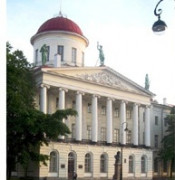
Pushkin House founded
On December 15 (28), 1905 on the initiative of the Russian cultural workers, Nikolai II signed the decree on the foundation of Pushkin House as a repository for manuscripts of Alexander Sergeevich Pushkin and the great persons of his age.
Back in 1899 under the Academy of Science was formed a Commission for preparation of the centenary of A.S. Pushkin. Initially the Commission projected to rise a monument to the poet but gradually the idea transformed into the museum creation. The capital for the museum construction was built up of the means coming from charity concerts, performances and readings. These events were organized in the country from 1902, usually by literate, dramatic and musical societies that amounted to 250 at the time in Russia.
In April of 1906 the government assigned a sum for the Pushkin library acquisitions. Later the library was given over to Pushkin House marking the dawn of a huge collection of books, manuscripts and objects relate to the name of the great Russian poet.
In 1930 Pushkin House was transformed into the Institute of the Russian literature under the Russian Academy of Science.
Gradually the Pushkin House collection increased including literate relics, autograph and printed matters of the writers of all ages. In 1925 to the ownership of Pushkin House was transferred the last apartment of Pushkin on the embankment of Moika river, in 1934 – Pushkin reserve in Pskov, in 1947 – all the displays of the All-Union Pushkin exposition. Pushkin museum complex created by Pushkin House in 1953 became autonomous and broke up into two independent museums: the All-Russian Pushkin museum and the Reserve based in Mikhailovskoye. The poet’s library and all his manuscripts remained in the Institute of the Russian literature.
The Institute of the Russian literature contains a literary museum, a phonograms archive, a library and an “antiques repository” that includes the vast collections of the Old Russian manuscripts beginning from the 12th century as well as books published in Russia before the 18th century. Pushkin fund includes as independent collections the records relating to the poet’s life and creative work: information on his ancestors, his years at lyceum and his milieu, commercial papers relating to his service, police observations, his duel with J. Dantes, the case concerning the children guardianship and trusteeship after his death, materials on Pushkin reserve in Pskov, translations of Pushkin works, graphic and musical materials, bibliographic indexes. Also Pushkin House shelters the collections of V.A. Zhukovsky, K.N. Batuyshkov and N.I. Gnedich, the archive of E.A. Baratynsky, the most significant part of Lermontov heritage, Aksakov archives.
In 1995 Pushkin House was included into the State code of the most valuable cultural heritage objects.
Lit.: Баскаков В. Н. Пушкинский Дом. 1905-1930-1980: Исторический очерк. Л., 1980; Баскаков В. Н. Библиотека и книжные собрания Пушкинского Дома. Л., 1984; Баскаков В. Н. Рукописные собрания и коллекции Пушкинского Дома. Л., 1989; Баскаков В. Н. Пушкинский Дом. Л., 1988; Имя Пушкинского Дома [Электронный ресурс] // Институт русской литературы (Пушкинский Дом) Российской Академии наук. 2003-2013. URL: http://www.pushkinskijdom.ru/Default.aspx?tabid=54.

